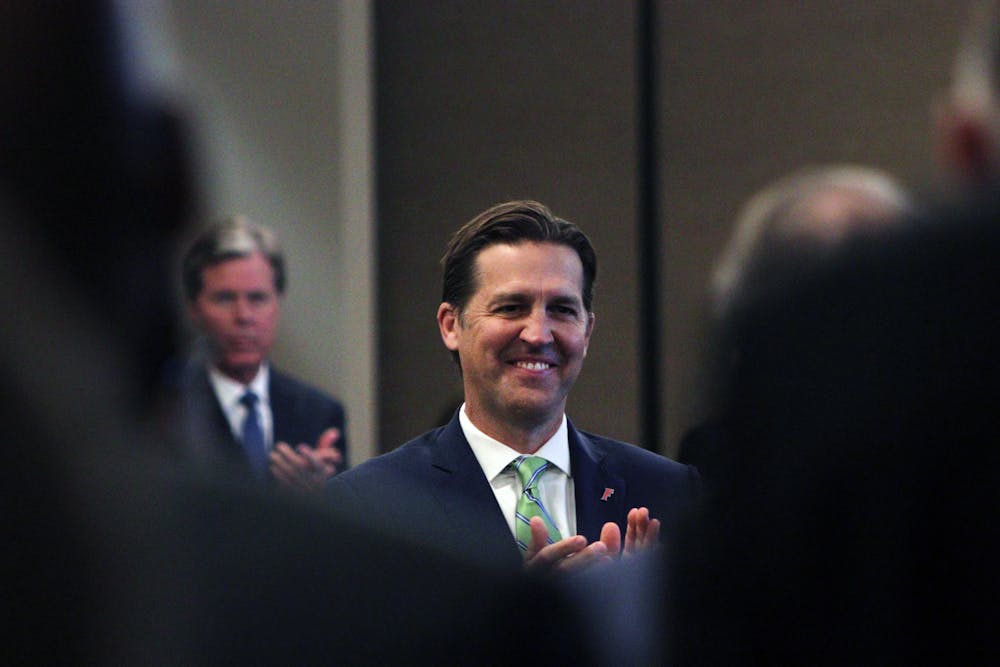This article has been updated to reflect UF President Ben Sasse's assertion that he did not advocate for department reductions or intend to lower tuition costs in private meetings with faculty. The Alligator initially reported otherwise.
A new strategic plan proposed by UF President Ben Sasse has sparked skepticism among UF faculty and students, but Florida lawmakers don't seem too worried.
Sasse discussed his preliminary strategic plan with faculty about two weeks ago. He addressed adjusting tuition prices, eliminating departments and reevaluating professors’ productivity, professors, who spoke anonymously to The Alligator because they feared repercussions from disclosing details of the president's remarks, said.
While professors said the plan raised concerns about topics like increased tuition and fees with the UF community, Florida legislators from both the majority and minority parties clarified that Sasse's proposals won’t have an immediate impact on the university.
During his presentation, Sasse mentioned the Bright Futures scholarship program, which he said contributes to underpriced tuition costs.
"We are the only state that loses money on every student," Sasse said during a presentation. "We should definitely be charging ability-to-pay for children of the wealthiest."
As the state Legislature established Bright Futures, Sasse can’t revise the program. The scholarship has helped more than 950,000 students afford post-secondary education in Florida since launching in 1997.
Florida House Rep. Yvonne Hayes Hinson, D-Gainesville, said changes to scholarship programs like Bright Futures could make higher education less accessible to lower income students.
“It'll start exploiting a certain demographic of the state that has had access over the years,” she said.
Florida schools’ low tuition has been a leading factor in attracting out-of-state students to the state, making acceptance to UF more competitive. Florida university tuition is 17% lower than the national average, and the state ranks No. 1 for tuition and fees, according to the U.S. News and World Report.
UF’s acceptance rate has continued to decline for several years and averages at about 30%.
Hinson does not foresee any tuition adjustments Sasse makes inciting drastic effects on Florida's academic or financial allure for prospective students.
“I don't think it'll make it less competitive,” Hinson said. “The state universities have worked very well for all income levels.”
Hinson plans to eventually meet with Sasse to learn more about his vision for the university.
For the 2023-2024 academic year, UF has the 11th highest cost of attendance for on-campus full-time undergraduate Florida residents among the 12 State University System of Florida schools.
As a UF graduate with two children in the school system, Hinson said she doesn’t want to see Sasse, a former senator from Nebraska, add to student financial hardship. Keeping student tuition affordable for students from low-income households should not be debated, she said.
“I don't anticipate a new president coming in from another state not taking the time to get a full understanding and comprehension of the state,” she said.
Florida Sen. Keith Perry, R-Gainesville, said those with negative reactions to Sasse’s strategic plan may not have a proper understanding of the president’s goals.
In previous conversations, Sasse and Perry have not discussed raising tuition costs. However, Perry said UF should review its funding distribution practices as the university continues to climb national rankings for higher education.
“The question becomes what is the value of the education versus the cost,” he said.
Universities often rely on general revenue funding because they don’t raise enough money through tuition and fees, Perry said.
Florida tuition has not changed since 2013 with a 1.7% increase. Florida higher-education officials discussed the possibility of raising out-of-state tuition by 15% in June. The plan has since been put on hold.
“One of the things that we're looking at — and I'm going to work with President Sasse closely on — is how do we make sure that the universities are operating as efficiently and cost effective as they can,” Perry asked.
Sasse also said he wants to reduce the number of UF departments from 199 to about 140, according to one of the professors who attended the faculty meeting. However, an email by a UF spokesperson disputed this. Nevertheless, this proposal does not necessarily raise flags about opportunities being removed, but instead seeks to consolidate resources, Perry said.
“I think that we always have to look at what things can be consolidated or replaced by AI and other forms of learning,” he said.
Additionally, Sasse highlighted how some professors seem to be underperforming with how many classes they teach and the research funding they obtain.
There needs to be some semblance of an evaluation model in place to differentiate between higher achievers and lower achievers in the workplace, Perry said.
Having a model to follow allows for people like Sasse to make sure employees are paid fairly for the amount of quality work they produce, he added.
“We cannot maintain the best teachers, the best professors, the best scientists, unless we pay them,” he said. “It's a competitive market. We have other institutions that are looking to steal them away.”
Contact Sophia at sbailly@alligator.org. Follow her on Twitter @sophia_bailly.
Sophia Bailly is the Fall 2024 University Editor. She interned for The Times-Picayune in Louisiana this past summer as a Capitol News Bureau reporter. When she's not reading the news, she can be found listening to podcasts, going for a run or studying Russian.






